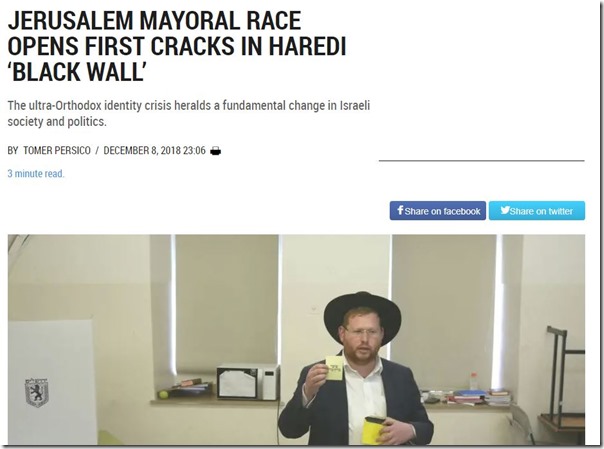With members of the ultra-Orthodox parties constantly saying they’ll support Benjamin Netanyahu for prime minister, one would expect the notion of them as the ones who can tip the scales would fade, yet it stubbornly persists. It’s not clear, for example, how anyone can seriously argue that all Benny Gantz’s party needs to do to win the ultra-Orthodox seal of approval is to part ways with Yair Lapid, or that Ehud Barak is someone with whom the ultra-Orthodox could tango.
These vain hopes are based on the assumption that the ultra-Orthodox, the Haredim, hold no firm ideological position regarding the occupied territories that would rule out a withdrawal, therefore they could countenance being part of a left-wing government aspiring to a two-state solution. Alas, what we have here is a case of drawing faulty conclusions from true facts. Yes, rabbis Elazar Shach and Ovadia Yosef ruled that it is permissible to return land and evacuate settlements in return for peace, but this doesn’t mean they had any special affection for the Israeli left. Quite the opposite.
On the one hand, Shach, the great rabbi who shaped the worldview of Haredi society today, ruled that “according to Jewish law, there is nothing that would prevent ceding part of the Land of Israel for the sake of peace”, and indeed was so dovish that he opposed the Golan annexation law and the Basic Law that declared Jerusalem the capital of Israel (1980).
On the other hand, he also often expressed his unequivocal unhappiness with the left. In 1990 he said that among the left are “despisers of the Torah and despisers of mitzvoth,” and that Likud is the party of “those of simple faith.” In 1992 he said: “No one should connect with the leftists, who are totally treif” because “the leftists openly say that they don’t believe, that they deny everything,” while on the right “there are individuals who violate tradition but in public show respect to religion.”
This sort of gross generalization actually contains a speck of truth. The late Rabbi Shach is gazing down on the right and left throughout the generations. He knows that the left around the world arose out of the spirit of the Enlightenment and its anti-religious and anti-traditional tendencies. The right is the more conservative and more religious side. Regardless of the parties’ positions on security issues, the left’s attitude toward tradition is complicated at best, while on the right it’s much more straightforward.
As Rabbi Shach wrote, “There have always been many transgressors of the commandments”, however, “this was done in a private way, not as a method” – that is, neither the left nor the right observes the prohibition against mixing milk and meat, but for parts of the left, it’s a matter of ideology. There’s a difference between one who does so to satisfy his appetite and one who does so to make others angry.
Thus, the Haredi parties are Likud’s “natural partners” not because of their attitude toward the Land of Israel, but because of a shared fondness for tradition (and also, these days, a tendency toward anti-liberalism). It’s not a dispute between hawks and doves, but between conservatives and progressives. The Haredi leaders may be capable of being as dovish as new Meretz leader Nitzan Horowitz, but they will forever view the left as the flag bearer of secularism. Once it’s understood that this is the starting point for the Haredi world’s approach to politics, it’s clear that the Haredi parties’ first choice will always be the right. This is the basic situation, and no amount of flattery and groveling will change that.
At the same time, attacks from the center-left on the Haredim won’t hurt or “ruin” anything, because if the Haredi parties ever end up in a left-wing government, it will only be for lack of any other choice. When important interests lie in the balance, all hostility and insults are forgotten. We saw how even Bezalel Smotrich, when he wanted badly enough to be transportation minister, was able to tolerate Jews working on railway repairs on Shabbat.
The left-wing parties could do themselves a favor by recognizing this reality. Lapid has left behind the chapter in his political career in which he groveled to the Haredim, having seen that it had no effect on their positions. This certainly isn’t a call for incitement against the ultra-Orthodox, and it would certainly be best for the left not to promote an anti-religious stance and thereby fulfill the Haredim’s fears.
However, the government’s relations with the Haredi community must be restored to proper proportion. With Netanyahu, the Haredim had a blank check, and it was cashed at the taxpayers’ expense on the economic front, at the expense of relations with American Jewry on the diplomatic front, and on the social front at the expense of women who were discriminated against in academia, the army and the public space in general. The time has come to return to the principles of liberal democracy.
—
Published in the Haaretz op-ed page.



